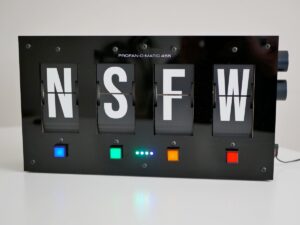An ingenious and practical invention shared by IMGURian @GuzziGuy.
The post became so popular, that the maker has decided to offer them for order from Etsy.
“I realise the price is a bit high, but there's a lot of work and materials in it, it's as sensible as I can make it!”

About the making of:
This is a project that goes back a while. About 9 years ago, I got interested in nixie tubes and built a few clocks from kits; during which I learned of the FLW - Four Letter Word, a toy created in the 70s using huge B7971 nixie-type tubes. The original creator had made a new, updated kit - which I ordered (and obtained the tubes elsewhere), but he went AWOL (causing some drama in the community) and it never arrived.
So worked on my own version with an Arduino - and got it running, but ideally I wanted to make some more for friends etc but a) my electronic skills were not up to converting my breadboard into a PCB; and b) the tubes were expensive even then and not practical to obtain. Not to mention that by then, other folks had made this better than I could. Project shelved, indefinitely.
Cut to late 2019, when I discovered Scott Bezek's split flap project. A lightbulb moment - a splitflap display is arguably the only thing cooler than giant nixie tubes; I'd always wanted to make something with one, but new or old ones are difficult and/or expensive to acquire. Never had I imagined one could be DIYed; so Scott's AMAZING work on the physical design, the circuit and the driver code was a revelation. Designing the display from scratch remains beyond me, but I'm a tinkerer, a masher-upper... so I built on Scott's design and the FLW project was revived.
I had two main changes to the design - the first was production of parts via CNC. Scott has detailed instructions on DIYing the display, involving ordering laser-cut parts, adding self-adhesive lettering to plastic cards and cutting them to size - all of which are great for a one-off, but I wanted to design this to be repeatable... so I spent far longer refining parts so they could be done again.
The other main change was the electronics - Scott's Arduino code works perfectly, but is just a driver for the display - actual words/numbers etc would come from elsewhere. To make it into a self-contained unit, I started on the Arduino, but ran into a couple of roadblocks, so switched to the ESP32 - also a revelation, it's cheap and hugely more functional than the standard Arduino.
More glorious nerdy details in the original post.
Split-flap four letter word machine (aka Profan-O-Matic 455)


